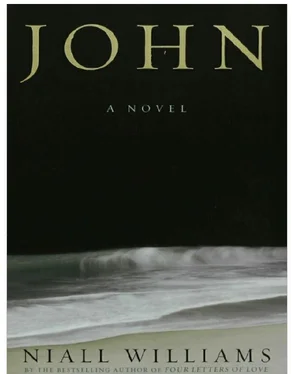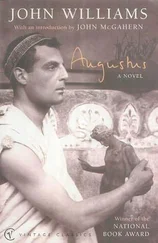Several times, as he comes and goes with chores readying for the end of the fast, Papias thinks the moment is at hand. He stops. One time he drops to his knees so certain is he that he hears trumpets clarion. But the noon passes without event. The day remains strangely bright, but nothing more transpires.
'It will be hereafter,' he counsels himself. 'The fast will end at midnight when I ring the bell, and then, then. .' He does not finish. Although there are none listening, he does not want to say aloud the words lest he be guilty of presumption and upset the order of things.
The afternoon is long, the evening longer.
The disciples continue as before. As Papias brings to each a beaker of water, none show sign of even knowing it is the last day. They sit or kneel in silence. He wants to tell them. His mind flutters with a hundred thoughts, caged birds. It is nearly done, he wants to say, and the day shines brilliant with thanksgiving and God's glory. The hour is near. It is near at last. But Papias can do nothing but pour the water and bow and leave and visit the next.
The sun weakens. He comes inside the final hours and kneels by the Apostle. On the face of John, too, there is no sign of the nearness of the end. He is away in himself and has passed beyond the suffering of time.
Across the darkness, at last, Papias goes. Sky is million-starred, moon-lovely. He goes first to the furthest dwelling, that of Lemuel, and rings the bell. Then he hurries back along the ledge walk, where are Meletios and Simon, and beats the clapper there, then — his excitement making slip his sandals on the rocks — to Danil, Ioseph, and Eli. He cannot move quickly enough. It is as if an instant after the bell sounds the heavens may open, the stars fall away down the sky. His heart races. It will be now. They have done it; they have fasted forty days and nights and are as pure as any of God's creatures walking on the surface of the earth. They are as lights lit. From the highest point in the heavens our Lord could see them shining, and at their centre his beloved disciple.
Come. Come now.
Without word — absence from speech making the muscles of their mouths tight — without the slightest show of victory, through the glittering dark the disciples move. They gather into the cool air of the cave. John reaches out a hand for Papias.
'Help me to stand, Brother.'
Papias takes the thin fingers. The Apostle is bent down, his head low, and at first can raise only his arm above him. It is as if he has prayed himself into the earth, and his knees and torso are as a tree grown into a stone.
He makes a small groan as Papias crouches down to place his left arm around him and ease him into standing.
'Thank you, my brother.'
'I have water here readied.'
'Good. Bring me to it.'
Into the tall water pot Ioseph dips the scoop and empties it into the cupped hands of the Apostle. John washes his face, his hands, and then his feet. The others do likewise. Cleansed so, they come and sit in a circle.
'Let us give thanks,' John says, and when they have, he says the psalm, ' "Behold how good and how pleasant it is for brethren to dwell together in unity." '
The disciples pray together for an hour before coming to share the supper Papias has prepared. They can eat only little, but take of the communion bread and wine. They say almost nothing. None refers to the fast or utters any hope of what may transpire. They have about them a quiet, radiant contentment, but Papias wants more. Twice he leaves the table to go outside and watch the sky.
Now. Surely it will be now.
But moon and stars retain their places in the firmament. The face of night is unchanged. After the communion supper the disciples take the hands of one another in love and thanksgiving and return to their dwellings.
No angels come. No trumpets sound.
But soon after sunrise the following morn the thin figure of Eli comes. He hurries up from the fishers' huts, where he has gone to bargain for salted fish.
'Come. Come, there is news!' he cries out, waving the other disciples to follow him to the cave. 'Good news! Come!'
He is in his sixth decade, but with the short, wiry strength of the Bereans. Papias comes out to meet him.
'What is it? What is it, Eli?'
'Good news. Good news.' He stops, waits for his breath to catch up with him. The others are approaching across the stone-way. John comes out into the full of the sunlight.
'Tell, good brother Eli,' he says calmly.
'I went to bargain for salt fish, and there was a boatman come from the mainland. "O Christian," he said, for he had been told of us. "Good news for Christians." "What news?" I asked him. "You have not heard?" said he. "We hear nothing of the outside world," I told him. "The emperor is dead," he said. "But before his death he did decree that all persecution of Christians should be ceased, and banishment lifted herewith." '
Eli stops, his breath heaves in his thin chest. There is a stunned silence, in the mind of each disciple a great throng of questions pressing forwards. They look to John. A moment. Another. His white hair gleams in the light.
'Praise God,' he says at last.
'Praise God,' they all rejoin.
Then he holds wide his arms, as if he takes to him light or love.
'My brothers,' he says, 'the Lord has spoken. Our work is not over. It is not even begun. Prepare. We leave this island in three days. We sail for Ephesus.'
They have three days to prepare. In spring light the community is quickened. Age falls off the elders, Papias thinks, and the weakness of after-fast vanishes as if their bodies are things of no consequence. Beneath blue skies the island is no longer a place of banishment, but where they have been steadily preparing their spirits for this, the return. With light step he crosses to the dwelling of Simon, who is caretaker now of the papyri of Prochorus. He brings the message that nothing must be left or forgotten, and is to offer his help. They must bring with them the testaments of their long enduring and belief. Now persecution is at an end. In Papias's mind he understands it as though the world has been cured of an illness. It was not ready before for the Christian message. But time makes all things come to pass, and now, now the glory is near. He moves nimbly up the stones. Perhaps more than the others he feels triumphant joy. He wants to shout out, sing praise into the wide sky. He, after all, has known nothing of true persecution; he has no experience of being despised, spat at, jeered, locked out of the synagogue. He knows the history, but it is not scarred into him as in the elders. He imagines their arrival in Ephesus, the word spreading from the dock as the boat pulls in, the excited crowds that will gather as they walk into the great public square of the State Agora. At last, at last the world will see. Now will commence a time of brotherhood, of charity, hope, of faith. This is what the Apostle meant when he said their work was not even begun. He knew, Papias thinks. He knew with the wisdom of ages that if he waited long enough on this island, eventually the world would turn, the world would at last be ready. And now it is. A time of love is born.
With such rapturous vision, Papias comes inside the dwelling of Simon. He stoops inside the open doorway to see the elder disciple seated on a low stool, his face in his hands.
'Brother Simon.'
The elder raises his head from the mask of his fingers.
'Do not approach!' he calls out.
Papias is startled. 'I am come to help you collect the scriptures of Prochorus,' he says.
'Do not approach further! I command it.' Within the brown umbra the disciple's pale face stares.
'Brother, are you ill?'
Читать дальше










